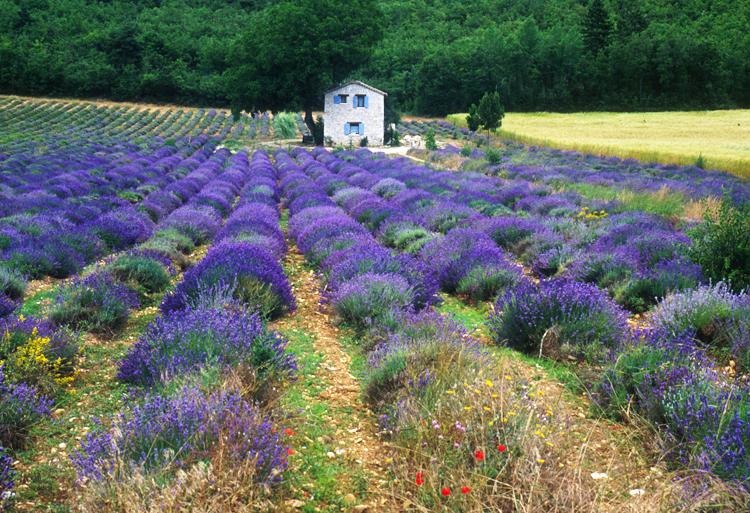The essential oils from the island of Corsica have a special place in aromatherapy. An explanation for the uniqueness of the Corsican essential oils is found in the recent history of modern aromatherapy.
When modern aromatherapy first took shape in the mid 1970s, essential oils came from one place and basically one place only, the large fragrance houses of Grasse or New York. These classic fragrance houses were highly proficient in distilling and extracting natural products for onward processing of fragrances and flavors into perfumes, foods or cosmetics. To manufacture these products in constant and even quality the natural raw materials must be of reliable and constant quality. The variations caused by nature, through climate, soil, altitude etc., are an impediment to the industrial process. As a result the processors have built extensive know how for adding and removing components from the natural product, so that one years batch is basically identical with that of another! Lavender for instance should not have an arbitrary concentration of Linalyl acetate if used in industrial processing, its concentration should be between 40 and 42%. Hence Lavender 40/42 is found on the market, where the concentration of Linalyl acetate has been augmented to reach the desired level.
This process is also known as standardizing and it can also be used to adjust or even reconstitute essential oils to bring down the price point. It is important to understand that this is exactly what industrial processors do: Adjusting essential oils so the cost comes down so low that the resulting mixture can still be sold at a price below the pure natural oil and still generate a hefty profit. This is where the necessary margins come from. Simply buying and selling natural oils does not generate the returns – let alone dividends for the share holders – which these large outfits require.
As a result early aromatherapy was caught between the writings of Valnet and Tisserand who insisted that essential oils for healing had to be pure and unadulterated and the reality of a supply where practically everything coming out of Grasse was standardized or adulterated!
Then came Corsica.
As aromatherapy gained some traction some distillers in Corsica made the leap and began to manufacture essential oils specifically for the aromatherapy market. No one in Grasse was interested in a high priced specialty like Inula graveolens, but aromtherapy icons Pénoël and Franchomme were. Inula proved itself to be probably the most effective mucolytic agent in aromatherapy. And since this oil went directly from the producers to the aromatherapy market it bypassed the standardization processes inherent in industrial processing.
The idea of genuine and authentic essential oils was born.
The same was true for another Corsican specialty, the Rosemary verbenone. No one in Grasse would be interested to buy a Rosemary oil for 350 Euros per kilo when the oils from Tunesia could be adjusted so that they could be sold for 20 Euros per kilo! But again, the aromatherapy market honored the the efforts of the Corsican distillers and began to integrate this fabulous oil into a seemingly infinite number of skin care products.
There are quite some essential oils form Corsica with basically the identical story: Green Myrtle, the perfectly mild essential oil to sooth the lungs, used by some even to support patients with pneumonia, Mountain Juniper, another perfectly mild essential oil, sometimes used to ease neuralgic pain.
Wild Fennel to sooth spasms.
Black Pine for preventing sun damage and also as a powerful decongestant for the prostate.
and a Cryptone chemotype of Eucalyptus polybractea, effective against HPV.
And then there is of course Helichrysum italicum, best known for its wound healing and tissue regenerating qualities.
Because of the unflinching dedication of the distillers to producing truly authentic essential oils for the healing purposes of aromatherapy Corsican essential oils have gained a wide following wherever aromatherapy is practiced. Especially comparing the Corsican Juniper or Fennel to their industrial counterparts immediately illustrates the difference between a truly authentic essential oil and the adjusted product so prevalent on the market.
